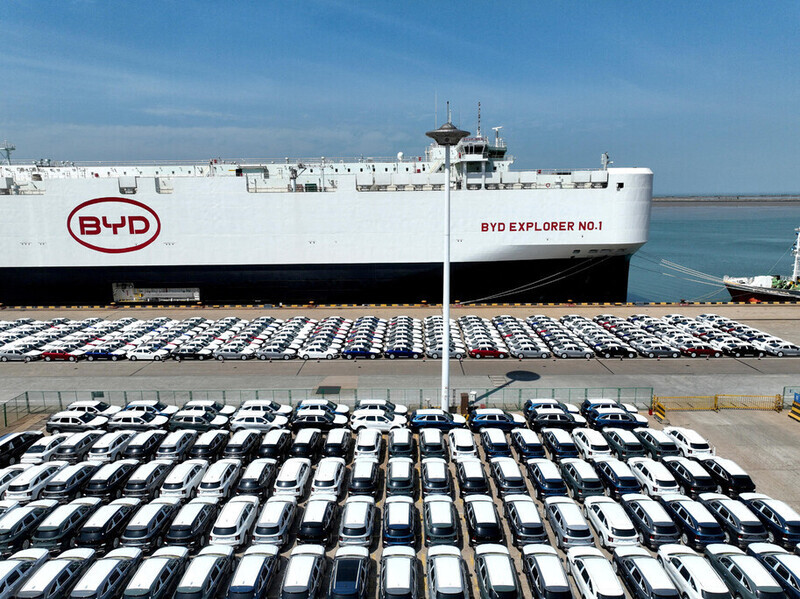hankyoreh
Links to other country sites 다른 나라 사이트 링크
[Correspondent’s column] The real reason the US is worried about Chinese ‘overcapacity’


By Choi Hyun-june, Beijing correspondent
“The ruckus about overcapacity? It seems like a sign that China’s doing well for itself.”
So said a Chinese official I encountered while I was covering the recent criticisms of China’s overcapacity put forward by the US and EU. While the US and EU are forming a chorus to condemn China’s overcapacity in the electric vehicle, battery and solar industries for hurting the global economy, Chinese authorities and media are tackling such criticism very well — in fact, they feel more relaxed and confident than anxious. During a recent trip to France, Chinese President Xi Jinping denied the “‘so-called’ problem of China’s overcapacity.” Where is such confidence coming from?
Chinese automakers were the stars of the Beijing auto show I visited in late April. Global automakers from South Korea, the US, Germany and Japan including Hyundai, GM, BMW and Toyota, were all present, but the number of lesser-known Chinese automakers was even greater. While there may be differences in specific technical aspects, there were some cars which, once you covered the logos on them, were difficult to distinguish: Which companies were they made by? German, Japanese, or Chinese?
We can also see another reason for China’s confidence in Beijing’s Xiaomi store. While their recent electric vehicle launch is also noteworthy, what is more eye-catching are the giant televisions which plaster an entire wall of the store. A 55-inch 4K-quality TV costs 1,699 yuan (320,000 won or US$235) and a 75-inch 4K-quality TV costs 2,999 yuan. Products with similar specifications from Korean or Japanese companies would cost at least two or three times as much.
Huawei’s recent growth spurt, which began last year, is also worth noticing. After stumbling under tough US sanctions in 2018, the company has been making a comeback, raising the quality of its smartphones by leaps and bounds, even briefly achieving the top spot in the Chinese market for the first time in four years.
In contrast to the rise of Chinese-made products, the performance of Western companies that used to thrive in China, such as Apple, Volkswagen and Tesla, has been plummeting. Apple’s sales in China are down nearly 20% so far this year, and Tesla is seeing similar declines. Japanese cosmetics and Starbucks coffee, once beloved by Chinese women and young people, are also struggling.
Some blame the recent surge in Chinese-made products on “patriotic consumption” or protection demonstrated by the Chinese government. The theory is that companies are able to advertise themselves with huge governmental help and in response, the Chinese public are buying products made domestically even if the quality is somewhat inferior.
While this isn’t completely wrong, reliance on the belief that the strength of China’s patriotic rhetoric to explain the power behind the Chinese market, which is now competing with global players, is proving flimsy. Just as South Koreans, who are fiercely anti-China, flock to Chinese e-commerce companies such as AliExpress and Temu, Chinese people prioritize self-interest over patriotism when it comes to their wallets.
The fact that the US and Europe have been criticizing China's overcapacity in electric vehicles, batteries, and solar may be a reflection of China’s already dominant position in these industries, as Chinese officials have said. China’s dominance is expanding rapidly from traditional manufacturing to green tech.
These three industries are also South Korea’s future core industries. How will we deal with this situation? Unlike the US and the EU, which are only trying to raise tariff barriers against China, Germany and France are singing the same tune while also reaching out to China.
Please direct questions or comments to [english@hani.co.kr]

Editorial・opinion
![[Column] Tariffs on China: Trump was dumb, Biden dumber [Column] Tariffs on China: Trump was dumb, Biden dumber](https://flexible.img.hani.co.kr/flexible/normal/500/300/imgdb/original/2024/0520/191716191153918.jpg) [Column] Tariffs on China: Trump was dumb, Biden dumber
[Column] Tariffs on China: Trump was dumb, Biden dumber![[Column] What if Seoul took reunification by force off the table? [Column] What if Seoul took reunification by force off the table?](https://flexible.img.hani.co.kr/flexible/normal/500/300/imgdb/original/2024/0520/3017161928630494.jpg) [Column] What if Seoul took reunification by force off the table?
[Column] What if Seoul took reunification by force off the table?- [Editorial] Intensifying US-China rivalry means Seoul must address uncertainty with Beijing sooner than later
- [Column] When ‘fairness’ means hate and violence
- [Editorial] Yoon must stop abusing authority to shield himself from investigation
- [Column] US troop withdrawal from Korea could be the Acheson Line all over
- [Column] How to win back readers who’ve turned to YouTube for news
- [Column] Welcome to the president’s pity party
- [Editorial] Korea must respond firmly to Japan’s attempt to usurp Line
- [Editorial] Transfers of prosecutors investigating Korea’s first lady send chilling message
Most viewed articles
- 1Xi, Putin ‘oppose acts of military intimidation’ against N. Korea by US in joint statement
- 2Kim Jong-un wanted to meet with residents of shelled Yeonpyeong Island in South, Moon recalls in mem
- 3To weigh costs and benefits, Korea must stop treating US troop presence as a sacred cow
- 4[Column] What if Seoul took reunification by force off the table?
- 5Berlin mayor hints at tearing down ‘comfort women’ memorial in city
- 6[Column] Tariffs on China: Trump was dumb, Biden dumber
- 7[Editorial] Transfers of prosecutors investigating Korea’s first lady send chilling message
- 8Naver’s union calls for action from government over possible Japanese buyout of Line
- 9[Exclusive] Truth commission to seek additional murder charges for figures behind 1980 Gwangju massa
- 10[Column] US troop withdrawal from Korea could be the Acheson Line all over